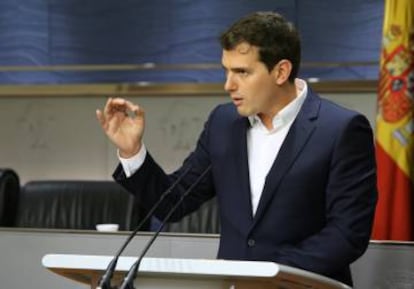Spain’s opposition teams up to probe ruling party over illegal financing claims
Pact between PP and Ciudadanos in trouble after government rejects calls for investigation
Ongoing allegations of illegal financing by Spain’s ruling party are causing a visible shift in political allegiances. Prime Minister Mariano Rajoy’s refusal to create a congressional committee to investigate the accounts of his Popular Party (PP) has pushed his ally Ciudadanos into the arms of the opposition.

On Tuesday, Ciudadanos leader Albert Rivera – who voted in favor of Rajoy’s reinstatement late last year in exchange for pledges of reform – teamed up with the country’s main opposition party, the Socialists (PSOE), and with the leftist Podemos to file a joint request in Congress for a probe into the PP’s alleged illegal financing.
It is the first time that all three opposition parties have joined forces since Spain got a new government in late October, ending a 10-month stalemate that included two national elections. Although Rajoy secured a second term in office, he now leads a minority government and needs support for all congressional initiatives.
We are going to end the law of silence that the PP wanted to impose
Irene Montero, Podemos
“It is necessary to ascertain the political responsibilities in the cases currently being tried in the courts,” said the Socialist spokesman Antonio Hernando, alluding to the Gürtel corruption case now at the trial stage.
“We are going to end the law of silence that the PP wanted to impose,” said Irene Montero of Podemos, suggesting that Rajoy himself could eventually be called before the committee.
“With or without Rajoy, the Bárcenas case is going to be investigated,” added Ciudadanos’ Juan Carlos Girauta, mentioning former PP treasurer Luis Bárcenas, who kept parallel party accounts reflecting transactions currently also under investigation.
But the PP spokesman in Congress, Rafael Hernando, described Ciudadanos’ joint initiative with the PSOE and Podemos as “a gesture of hostility and disloyalty by a privileged partner.”
Tit for tat
Before being voted back into office, Rajoy had signed a deal with Ciudadanos committing to fight corruption, among other reform measures. But the events of Tuesday now cast doubt over the future of this pact.

Tensions flared during question time, when Rajoy dragged his feet on his earlier commitment to create a congressional committee to look into the PP’s finances, as clearly stipulated in the PP-Ciudadanos deal.
Instead, the prime minister threatened to take such a committee to the Senate, where the PP has an absolute majority, and to extend the investigation to all parties in parliament.
His words were construed as a mockery by Rivera, who then turned to the PSOE and Podemos to suggest a joint request for a committee.
A deal in trouble
The PP's refusal to honor some of the points set out in its anti-corruption deal with Ciudadanos has pushed the partnership to the edge. Besides the investigative committee initiative, Ciudadanos will also team up with Podemos to try to eliminate Spain's system of aforamiento, or partial immunity from the courts enjoyed by members of Congress.
The PP went on the counter-offensive moments later, filing two requests of its own to create investigative committees in both chambers to examine the finances of all parties during Spain’s entire democratic period. This includes allegations of credit write-offs in the 1990s by the PSOE, and accusations that Podemos received funding from Venezuela.
The opposition would like its committee to get approval within the next 15 days and start working by June. But there are currently two other congressional probes about to get started, one to analyze Interior Ministry actions and another one to examine the banking crisis. And in theory, these two committees must finish their work before a third can get under way. In practice, this means that the PP finances probe would not be ready to start before the fall.
English version by Susana Urra.
Tu suscripción se está usando en otro dispositivo
¿Quieres añadir otro usuario a tu suscripción?
Si continúas leyendo en este dispositivo, no se podrá leer en el otro.
FlechaTu suscripción se está usando en otro dispositivo y solo puedes acceder a EL PAÍS desde un dispositivo a la vez.
Si quieres compartir tu cuenta, cambia tu suscripción a la modalidad Premium, así podrás añadir otro usuario. Cada uno accederá con su propia cuenta de email, lo que os permitirá personalizar vuestra experiencia en EL PAÍS.
¿Tienes una suscripción de empresa? Accede aquí para contratar más cuentas.
En el caso de no saber quién está usando tu cuenta, te recomendamos cambiar tu contraseña aquí.
Si decides continuar compartiendo tu cuenta, este mensaje se mostrará en tu dispositivo y en el de la otra persona que está usando tu cuenta de forma indefinida, afectando a tu experiencia de lectura. Puedes consultar aquí los términos y condiciones de la suscripción digital.








































